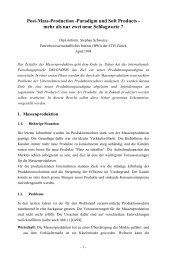The China Venture
The China Venture
The China Venture
You also want an ePaper? Increase the reach of your titles
YUMPU automatically turns print PDFs into web optimized ePapers that Google loves.
only after a certain time and even then, is made known step by step. 134 If difficulties arise<br />
during the negotiation process and the partners do not come to a solution or when a position is<br />
not acceptable, the Chinese leave the subject aside and go on to the next topic or change the<br />
level of discussion. It might appear to you that Chinese wants to drag out the discussions in<br />
order to wear down your patience gradually. In fact, the decision-making process in <strong>China</strong> is<br />
often slower than in Europe. <strong>The</strong> Chinese wants to avoid disharmony and may require inputs<br />
from national, provincial and local levels. 135 This interruption of the discussion does not mean,<br />
that the Chinese is giving up. If the subject is important for them, they will come back to it<br />
again at a later time. Chinese can be very persistent and do not just give up. German and<br />
Swiss mana gers often have problems with this style of negotiation. <strong>The</strong>y are used to discuss a<br />
subject until they get to a result. However, Chinese often change the topic although they did<br />
not find a solution. In their eyes a change in the discussion level helps to relax and can lead to<br />
a better atmosphere, making it easier to make progress in the negotiation. This tactic can be<br />
very stressful for Europeans who are determined and want to come straight to the point. It is<br />
necessary to be patient in negotiations with the Chinese. Fierce outbursts will not earn you<br />
any respect. Patience, flexibility and creativity are the keys in negotiating successfully in<br />
<strong>China</strong>. Be prepared for tough negotiations. Adhere to your principles and objectives. Maintain<br />
a quiet and dignified manner. If problems develop, you should be firm about your limits and<br />
your willingness to work with your counterparts to find a mutually agreeable solution.<br />
As we can see, Chinese and German or Swiss communication strategies differ considerably.<br />
Both sides have different ideas of clever negotiation. By the respectful toughness and<br />
persistence of the Chinese, European managers get the feeling that they want to pull the wool<br />
over their eyes in a systematic way. However, the Chinese do have visible patterns and rules<br />
in their communication strategy. When these patterns are recognised, it is a lot easier for<br />
Europeans to negotiate with the Chinese. 136 It is advisable to allow your counterpart to set the<br />
tone and level for frankness and to follow his lead. Remember, the friendlier Chinese talk<br />
about a subject the more important it is for them. 137<br />
134 Zailing/Reisch, 1994, p. 85.<br />
135 Dunung, 1995, p. 116.<br />
136 Dunung, 1995, p. 86.<br />
137 Heiniger, 1997, p. 134.<br />
133






